Zambia Report:
Music as a Business
By Steven Beck Copyright 2007
After returning from Sierra
Leone, the US State Department
asked me to go back to Africa and talk to musicians
about the industry. I
thoroughly enjoyed my travels to Sierra Leone so I signed
on. After about thirty hours of travel I arrived
at the Lusaka Airport in Zambia and met Keisha Lafayette,
the Public Diplomacy Officer for the US Embassy. She
and the driver took me to the Taj Pamodzi Hotel and helped
me get settled. Keisha
suggested I get some rest as we had a dinner scheduled
for later that night. She also mentioned that it
would be a busy week.
Lusaka is the capital of Zambia, a landlocked country
in Southern Africa bordered by at least eight other countries. It’s
roughly the size of Texas with a population of over 11
million. While it is know for it’s spectacular
wildlife and its natural beauty including Victoria Falls,
about 73% of Zambians live below the recognized national
poverty line. Per capita annual incomes are currently
at about $395, which places the country among the world's
poorest nations.
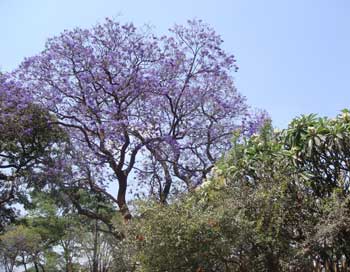
Jacaranda Tree in Zambia
After a few hours of downtime and a
long shower, Keisha and Betty Nalungwe (Cultural
Affairs Assistant) picked me up to go to dinner
with some of those involved in the Zambian music industry. The
restaurant was beautiful and the food hit the spot. Under
encouragement from some of the guests, I tried a locally
brewed beer called Mosi. I enjoyed it with dinner
as well as the engaging conversation then headed back
to my hotel to get some much-needed sleep, as the next
day would be jam-packed.
- Day One -
The driver picked me up in the morning
and we headed
to the American Corner for a press briefing that was
designed to spread the word about the events for the
week. Our
goal with these events was to show that
the music business could be developed into an industry
that generates income and could possibly support the
livelihood of those involved. This would
have to be done by realistically understanding who had
actual talent and supporting them with a well-rounded
music scene. Key factors include the cooperation
of labels. studios and radio stations as well as clubs,
journalists and distributors combined with efforts to
control piracy.
The press conference was done in conjunction
with Keisha going onto Kwacha Good Morning Zambia the
Saturday before. This is a news and entertainment
show similar to Good Morning America but broadcast
only on Saturdays. Slowly throughout the week we
were able to get our events some coverage on radio, television
and the newspapers. I even found some mentions
on the Internet.
Later that morning we had our first seminar with local
musicians and labels entitled “Key Elements of
a Successful Music Business”. I started out
with a presentation that described the development and
structure of the US music industry, the key elements
that I find necessary to keep the industry functioning,
and a few tips that have helped me out over the years. I
concluded with my thoughts that music is art and not
just a business and those that are involve in this industry
need to keep that in mind.
After the presentation we opened it up for questions
and discussions. What seems to happen during these
Q & A sessions is that many people understand that
a lot of hard work and persistence are needed in order
to be successful while others look for quick answers
on how to succeed. These people seem to get frustrated,
as there is no clear and easy path to making it. Success
in any business takes hard work, determination and talent.
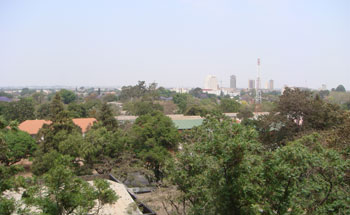
Lusaka Skyline
That afternoon we had a round table
discussion on Music Copyright. I do not consider
myself an expert on this topic but I did have to deal
with a number of issues relating to copyright in my business. Those
involved included an International Trade Specialist from
the US Department of Commerce, the Director and Chairman
of NAMCOPS (the Zambian version of BMI/ASCAP) and members
of the National Arts Council of Zambia among others. The
discussion focused on copyright issues and how the different
organizations could work together more transparently.
- Day Two -
The next morning I had an interview
scheduled with a local radio station but for some reason
they had to cancel. This
gave me some more time to prepare for my next talk with
radio DJs. My plan was to explain how royalties
were collected and distributed and what it took to get
music played on stations throughout the US. I also
wanted to show the different radio station structures
such as commercial, public and college.
Once again we opened it up for discussion
and comments. A
few of the DJs were of the opinion that the artists and
labels should pay the DJs for getting them exposure while
others saw it as a stepping stone for gaining alternative
opportunities. This is similar to the US as DJs,
because of their trend setting play lists, sometimes
rise to notoriety. We also discussed that many
independent artists never get any radio airplay but still
manage to have a successful career.
After lunch we headed over to Evelyn Hone College where
I was to speak to students about different paths they
could take in the music industry. From my understanding,
students would go to this school to learn how to teach
music to others. It seems as though they could
expand their curriculum to encompass other aspects of
music training from recording technologies to business
classes.
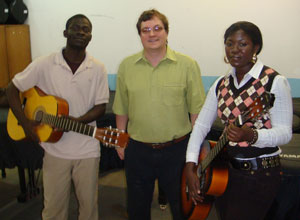
Steve Beck with Students from Evelyn Hone College
Before my presentation one of the students played and
sang a beautiful song to welcome me to their college. It
was touching and after my talk and the Q & A session
I got to interact with him a bit more and even play his
guitar a little. A lot of the students seemed particularly
interested in what I had to say. A number of students
mentioned that even with a degree from the college, it
would be very hard for them to find a job while others
saw this education as a springboard for other musical
endeavors.
- Day Three -
I checked out of the hotel early the next morning as
we were heading north to the Copper Belt area. One
of Zambia’s main natural resource is copper and
by visiting this industrial area, we could reach more
musicians. This would be about a four-hour drive
and for me it was nice to see some of the country.
When we arrived in Ndola, our first stop was to visit
the Minister of the Copper Belt. This was a brief
meeting and he seemed happy to have us and hear about
our mission. We talked about music and piracy
issues and, after some tea and cookies, he thanked us
for making the trip up north. Afterwards we met
with a number of law enforcement officials before heading
out to lunch.
That afternoon I did of another version my first presentation “Key
elements of a successful music business” but to
the musicians in Ndola. They had many of the same
questions but I started to realize something. It
seemed that the basic structure of the music industry
in Zambia was very similar to the US only on a different
scale. You have a few large stars that everyone
knows and who get played frequently on the radio. Then
you have a middle tier of musicians who work on their
craft by building their own studios, playing in bands
or working with a small label. Some of these have
CDs out or are working on them now. Finally you
have those who treat music as a hobby and something that
is fun to do but it will most likely never amount to
a career.
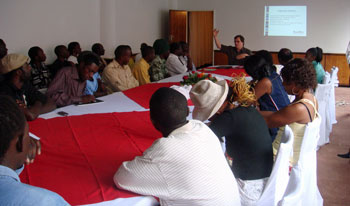
Seminar in Ndola
This was very enlightening to me. I was now getting
a better understanding of what the musicians in Zambia
were facing. The funny thing is that it’s
almost exactly what musicians in the US are facing. Where
do they get their music played? How do they sell
more CDs? What can be done to cut down on piracy? This
fit in with what I’ve been talking about.
That night we stayed at the Mukwa Lodge in Kitwe. The
lodge was a pleasant retreat with a lot of wooden masks
and outdoor sculptures. They also had a restaurant
that we had dinner in. I once again tried another
of the local lagers. This time it was Rhino, which
is known as the “Pride of the Copper Belt”. After
dinner we retired for the evening, as tomorrow would
be another seminar in the morning and a four-hour drive
back to Lusaka in the afternoon.

Sculptures at the Mukwa Lodge in Kitwe
- Day Four -
We had a light breakfast and checked out of the lodge
then headed to the American Corner in Kitwe. Since
very few of the musician I met had a website, this seminar
would be about promoting your music on the Internet. I
knew Internet access might not be available at the time
so I put together a number of screen-shots and planned
on showing people how to create an MP3 file, start a
MySpace page and use other free services to promote their
musical endeavors. If we did have web access,
I would then work hands-on to show how easy it could
be.
Shortly after I began explaining some
basic information about the Web and how it could help
musicians reach a larger audience, the power went out. Not
only did we not have Internet access but I also couldn’t
show screen-shots of the web sites that I was talking
about. I scrambled for a bit and then started going
over some points that I had given in other presentations. This
lead to an open discussion that I felt was the most productive
one of the whole trip.
There were questions from people who could just sing
asking how they could become successful and there were
comments from studio owners who work hard building their
studio and clients. Soon these people were talking
to each other and not just to me about their ideas in
the music business. As the session came to an end,
most of these people stayed around and continued the
discussion. I feel that this is the goal of these
presentations, not just to present information but also
to open up ideas that get people talking and working
together.
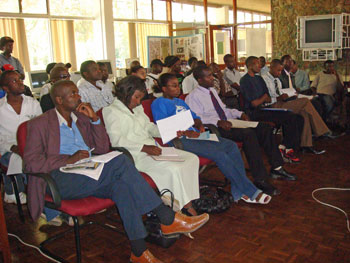
Seminar in Kitwe
On our way back to Lusaka we picked up some sandwiches
at the Sherbourne Guest House and started the four-hour
drive. About halfway through our trip we stopped
to refuel and were surrounded by a number of people selling
pirated CDs, DVDs and tapes. The music was mainly
from Zambian artists and could be purchased at almost
any price that you were willing to pay. Obviously
none of the income generated from these sales would ever
get back to the artists themselves and I was able to
see the scale of this problem firsthand.
- Day Five -
We made it back from the Copper Belt Friday evening
and got a good night sleep. It was now Saturday,
my last full day in Zambia with only two appointments
left. The first was an appearance on Kwacha
Good Morning Zambia. Both Keisha and I were
interviewed for the program where we talked about the
events of the past week. We also used this time
to publicize the final event of the week, a meeting with
club owners at the Brown Frog. Musicians were also
welcome.
The Brown Frog is a live music club in Lusaka. It’s
got a nice size stage, plenty of room for the audience
and a green room in the back. It seems like all
types of music happens there including hip-hop, rock
and salsa. The owner was very friendly and realistic
about the music scene. His key to survival is diversification.
He is developing plans to build a music education facility
at the club where students could learn about recording
techniques and live sound theory.
At three in the afternoon many club owners are either
waking up from the night before or getting ready for
the evening ahead. This had an impact on our turnout.
However there was a small group of musicians, some that
I had met before, so we all sat around a table and talked
about music. We shared our perspectives of the
music industry and explained how things operated in each
of our countries. Afterwards they took me outside
and showed off a banner that was made to promote their
next show.

Steve Beck and Betty Nalungwe with Lusaka Musicians
The next afternoon I was heading to
the airport and preparing myself for the thirty-hours
of travel. I
was impressed with how many people we were actually able
to meet and it felt as though we accomplished our goal,
which was to introduce the idea that music was not only
an art form but also a business that, if approached
properly, could sustain a livelihood.
Both Keisha and Betty were instrumental
in achieving this goal and making the whole week possible. They
had the vision and connections to reach out to the musicians
of Zambia. I’d like to thank them for their
graciousness during my stay and their flawless organization
that made the trip smooth. I’d also like
to thank Gretchen Weintraub in Washington again, as
she handled all of my travel arrangements and visa issues.
Free Music From Zambia:
Bana
Lengwe
by Chifwe Mwale and the C.M Beats Band from the album "Kolonganya" -
The singer says, “Why do those of us that are
still living continue to differ over petty issues
even after losing so many of our beloved friends”.
A message of unity to fellow musicians.
|